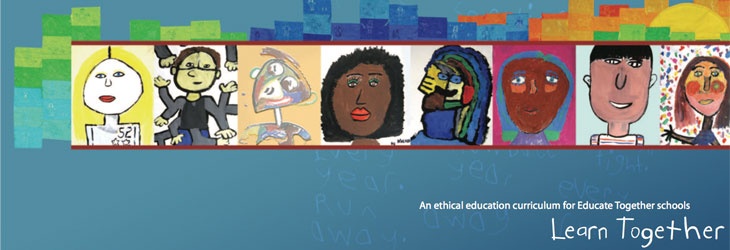Bray School Project N.S is an Educate Together primary school.
In September 1981 our doors opened as the second Educate Together primary school in Ireland.
The ethos of all Educate Together schools are based on four core principles:
1. EQUALITY
Educate Together schools from the outset respect all ethical and religious traditions. Every family’s background and ethical preference is respected and cherished within the school. The school does not teach any particular faith or creed but facilitates any group of parents to organise religious instruction for their children outside the main school programme. However, this does not mean that Educate Together schools avoid issues of ethics and morality. Educate Together schools have well developed ethical education programmes which teach children core values of appreciation of and respect for social, cultural and other human differences, health and safety, social responsibility and rights and other features necessary to inform a child’s developing mind to live in our rapidly changing society.
2. CHILD CENTERED
While covering the curriculum set out by the Department of Education for all national Schools, the educational programme of an Educate Together school is developed creatively through genuine dialogue between teachers and parents for the common good of the children.
3. CO-EDUCATIONAL
All Educate Together schools are co-educational and have active programmes to counter gender stereotyping and inequality in all aspects of school life.
4. DEMOCRATICALLY RUN
As all Educate Together schools are set up by groups of parents, parents have unparalleled access and involvement in the running and development of the school. The patron body (a structure that is insisted upon by the state) is a charity set up by the parents in the locality which is governed by a constitution, and whose decisions are controlled by general meetings and whose officers are regularly elected. This body allocates its representatives on to the Board of Management (the body that handles the day-to-day running of the school) in a democratic fashion that respects parents wishes. This, in addition to directly elected parents representatives, ensures that parents have a huge influence in school affairs. This unique level of parental involvement can only develop properly if it fully recognises and respects the professional role of the teacher and builds a genuine partnership between the professional and the parent to produce the maximum educational benefit to the children.

Learn Together
In all primary schools a daily period of time is set aside for the patron’s religious education programme. In Bray School Project this subject is called B.S.S.E – Belief systems, spirituality and ethical education.
B.S.S.E is based on the ‘Learn Together’ curriculum which is taught in all Educate Together primary schools.
The Learn Together Mission Statement:
To promote a philosophy of education in which no child is considered an outsider; which promotes the fullest development of ability irrespective of gender, class or stereotype and which encapsulates this ethos in a democratic partnership uniquely combining the involvement of parents with the professional role of teachers.
Strand 1: Moral & Spiritual
The general aim of the strand is to help develop in children a critical knowledge, understanding and awareness of right and wrong and a heightened awareness of social, ethical and moral standards through reflecting on the meaning and purposes of life. The strand should encourage and develop the individual on the journey to inner discovery and empower the child to make informed moral decisions.
Strand 2: Equality & Justice
The general aim of this strand is to develop in children a critical knowledge, understanding and awareness of issues relating to human rights, equality, culture and diversity, social justice and social inclusiveness and to empower them to make a difference.
Strand 3: Belief Systems
The general aim of this strand is to develop in children a critical knowledge, understanding and awareness of the teachings of religious and non-theistic belief systems and how these systems relate to our shared human experience. The emphasis will be placed on an exploration of the infinite variety and richness of humankind through nurturing a respect for a person’s right to hold and practice individual belief systems and through creating spaces where values can be articulated and critically examined.
Strand 4: Ethics & the Environment
The aim of this strand is to develop in children a knowledge, appreciation and respect for their environment and to empower them to take an active role in its stewardship.
Visit www.educatetogether.ie for more information
